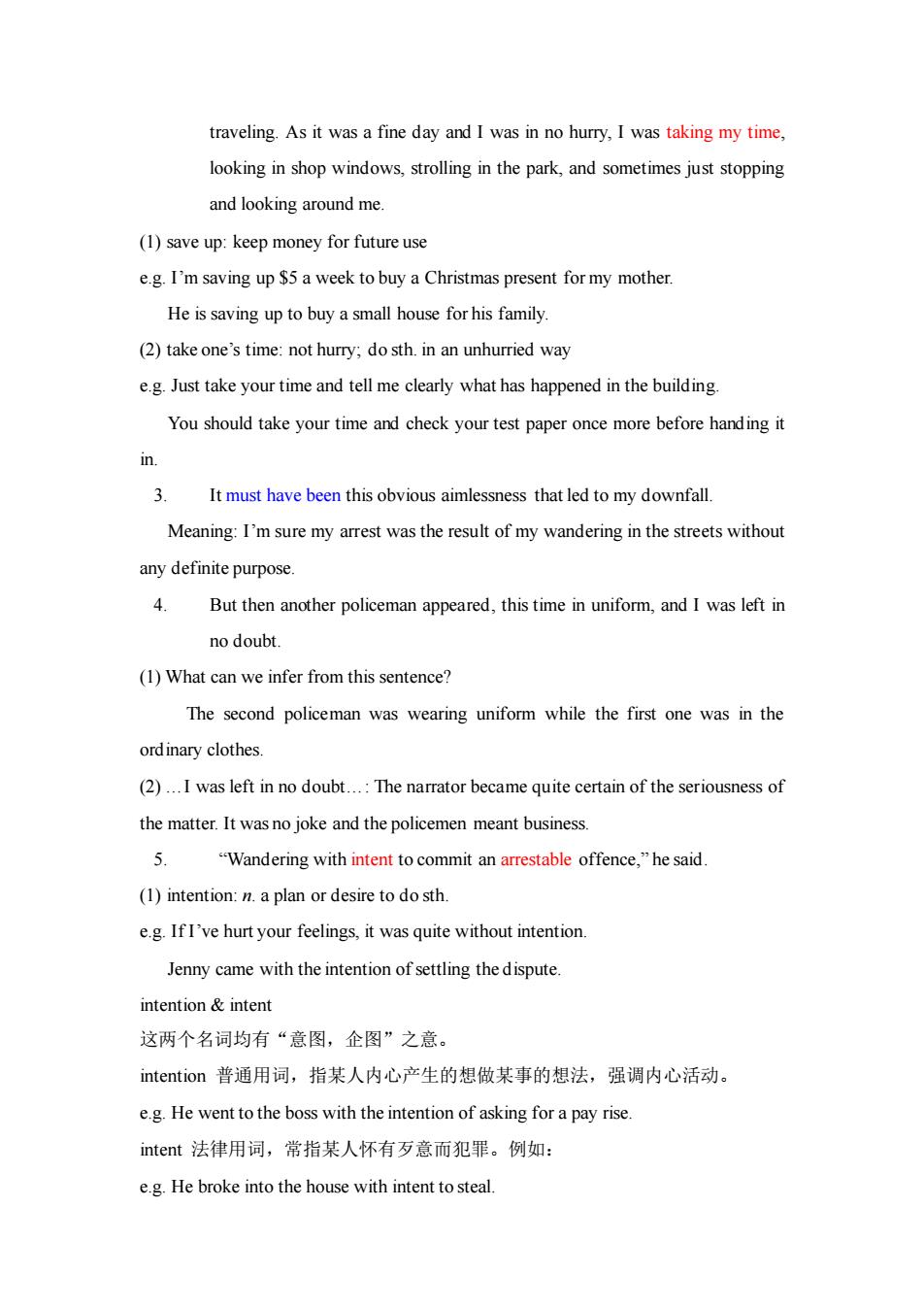正在加载图片...

traveling.As it was a fine day and I was in no hurry,I was taking my time, looking in shop windows,strolling in the park,and sometimes just stopping and looking around me. (1)save up:keep money for future use e.g.I'm saving up $5 a week to buy a Christmas present for my mother. He is saving up to buy a small house for his family. (2)take one's time:not hurry;dosth.in an unhurried way e.g.Just take your time and tell me clearly what has happened in the building. You should take your time and check your test paper once more before handing it 3. It must have been this obvious aimlessness that led to my downfall Meaning:I'm sure my arrest was the result of my wandering in the streets without any definite purpose. But then another policeman appeared,this time in uniform,and I was left in no doubt. (1)What can we infer from this sentence? The second policeman was wearing uniform while the first one was in the ordinary clothes. (2)...I was left in no doubt..:The narrator became quite certain of the seriousness of the matter.It was no joke and the policemen meant business. 5. "Wandering with intent to commit an arrestable offence,"he said (1)intention:n.a plan or desire to dosth e.g.IfI've hurt your feelings,it was quite without intention. Jenny came with the intention of settling the dispute. intention&intent 这两个名词均有“意图,企图”之意。 intention普通用词,指某人内心产生的想做某事的想法,强调内心活动。 e.g.He went to the boss with the intention of asking for a pay rise intent法律用词,常指某人怀有歹意而犯罪。例如: e.g.He broke into the house with intent to steal. traveling. As it was a fine day and I was in no hurry, I was taking my time, looking in shop windows, strolling in the park, and sometimes just stopping and looking around me. (1) save up: keep money for future use e.g. I’m saving up $5 a week to buy a Christmas present for my mother. He is saving up to buy a small house for his family. (2) take one’s time: not hurry; do sth. in an unhurried way e.g. Just take your time and tell me clearly what has happened in the building. You should take your time and check your test paper once more before handing it in. 3. It must have been this obvious aimlessness that led to my downfall. Meaning: I’m sure my arrest was the result of my wandering in the streets without any definite purpose. 4. But then another policeman appeared, this time in uniform, and I was left in no doubt. (1) What can we infer from this sentence? The second policeman was wearing uniform while the first one was in the ordinary clothes. (2) …I was left in no doubt…: The narrator became quite certain of the seriousness of the matter. It was no joke and the policemen meant business. 5. “Wandering with intent to commit an arrestable offence,” he said. (1) intention: n. a plan or desire to do sth. e.g. If I’ve hurt your feelings, it was quite without intention. Jenny came with the intention of settling the dispute. intention & intent 这两个名词均有“意图,企图”之意。 intention 普通用词,指某人内心产生的想做某事的想法,强调内心活动。 e.g. He went to the boss with the intention of asking for a pay rise. intent 法律用词,常指某人怀有歹意而犯罪。例如: e.g. He broke into the house with intent to steal